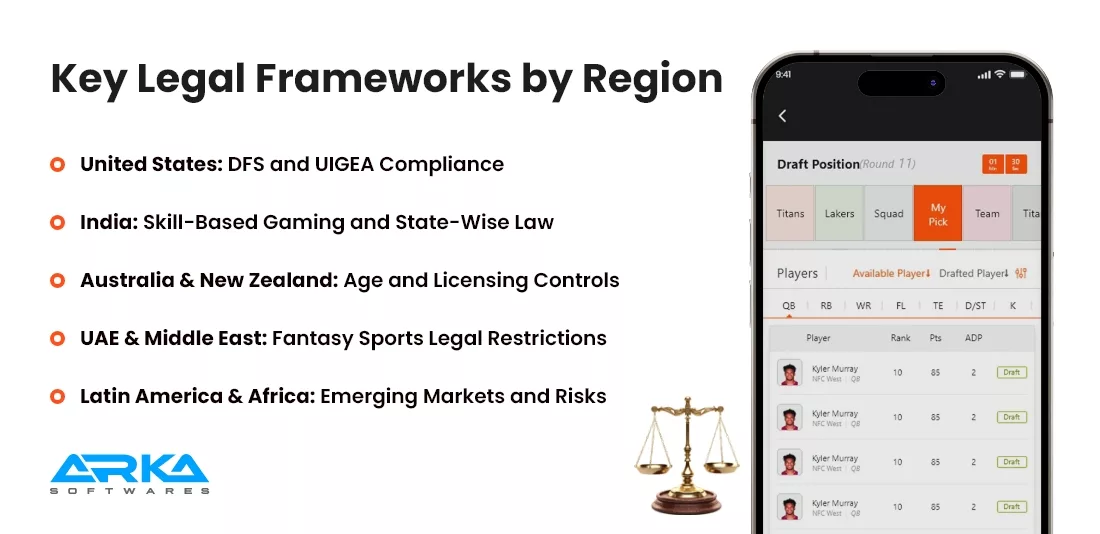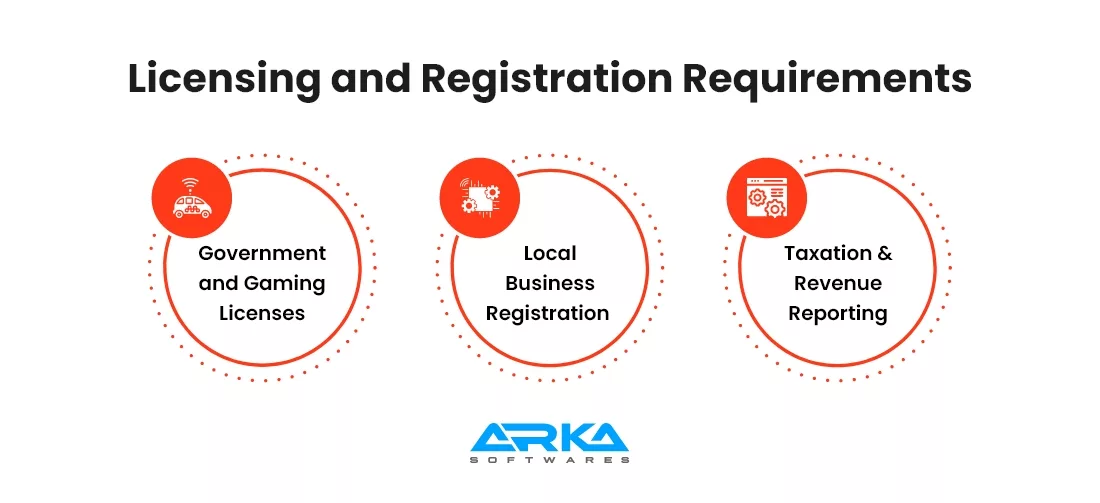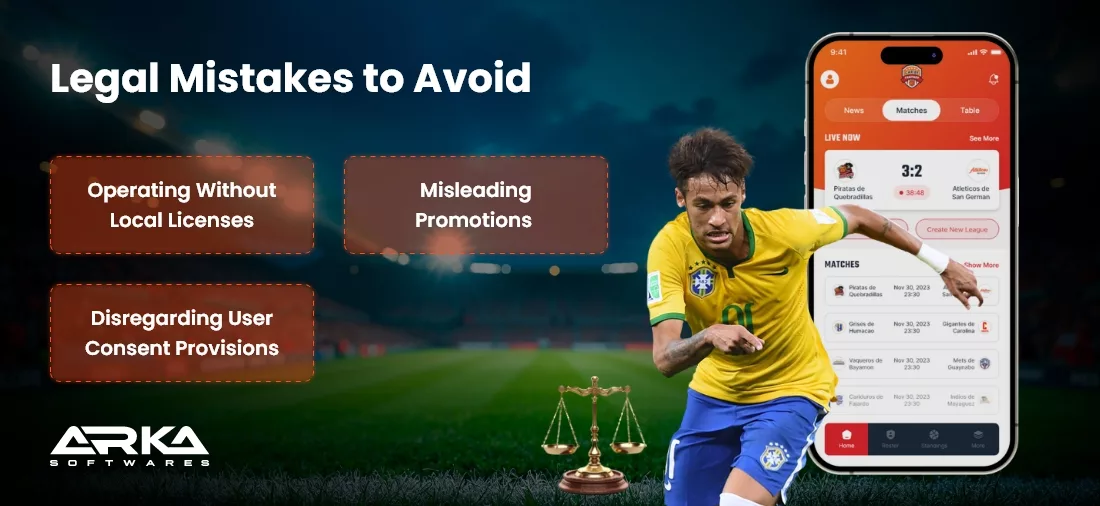Compliance is a key factor in fantasy sports, as the industry crosses various jurisdictions. Operators must follow laws on gambling, data privacy, consumer protection and taxation to operate legally. Compliance means getting the licenses, age and location verification, user data security as well as having transparent prize structures.
Noncompliance means penalties, reputational damage, and shutdowns. It is important to stay updated with regulations and practices of responsible gaming for growth in fantasy sports.
Compliance in Fantasy Sports is all about whether fantasy sports are considered a game of chance or a game of skill. This is important because games of chance are governed by stricter gambling laws, while games of skill are less regulated.
Most courts have ruled fantasy sports are games of skill since they require knowledge, strategy and analysis of the players’ stats. The line gets blurry, especially with DFS where things can look like luck.
A game of skill has a high degree of user experience, choice, and knowledge, i.e., selecting players on the basis of performance data. Courts in the majority of jurisdictions, such as the United States and India, have adjudicated fantasy sports to be games of skill as they are analysis-based.
Contrarily, a game of chance relies heavily on chance, i.e., lottery or slots, and is regulated by gambling laws. Fantasy sports operators must make their websites more skill-oriented so that they will not be operated as gambling, which would lead to stricter regulation.
Fantasy sports are different around the world based on local laws, cultural acceptance and economic interests. Fantasy sports are legal in some places, others have laws or restrictions due to gambling. Below, we outline the principal legal structures by region, where we specify challenges and requirements for fantasy sports app providers.
US fantasy sports is governed by the Unlawful Internet Gambling Enforcement Act of 2006. Fantasy sports are usually not in the domain of online gambling as long as they meet certain requirements. These requirements are skill games with clear prize structures and not based on individual game outcomes.
But they also differ state by state, with New York and Massachusetts having DFS licenses, while Washington has DFS banned.
Fantasy sport app developers must comply with state laws, for example, age restrictions (generally 19+ in some states) and geo-location software to close off access in restricted zones.
Operators must also handle intellectual property rights, taking permission from sports leagues for player names and logos in order to prevent legal disputes.
The Indian fantasy sports market is thriving with the high tide of cricket mania and Dream11’s platforms. The Indian Supreme Court has classified fantasy sports as a skill game and kept them outside the ambit of the Public Gambling Act, of 1867.
State laws differ, and states like Assam, Odisha, and Telangana ban or restrict real-money gaming.
The development of fantasy sports apps in India includes compliance with state-level regulations. For example, procuring a no-objection certificate (NOC) in some states and adherence to advertising standards to ensure avoiding the promotion of gambling-like activity.
Tax is another key issue, where operators must tax a 30% tax on the user’s winnings under the Income Tax Act. Fantasy apps must also have robust Know Your Customer (KYC) measures in place to verify users and deter fraud. Europe: GDPR, Gambling Legislation & Licensing
In Europe, fantasy sports sites must navigate a complicated matrix of gambling law and data protection legislation.GDPR requires explicit consent, data minimisation and transparency in data use. Non compliance can result in up to €20 million or 4% of global turnover in fines.
Legislation governing gambling varies by nation. Fantasy sports counts as a skill within the United Kingdom and doesn’t come under gambling licenses, yet operators are still obligated to register with the UK Gambling Commission for the purposes of certain formats.
Germany and France introduced more stringent controls on licensing within any platform that includes money transactions. Application developers of fantasy sports must be in a position to adjust their platforms so as to comply with such varied regulations.
Fantasy sports are seen by New Zealand and Australia as a game subject to their respective gambling legislation. Australian real-money fantasy sports sites have to be licensed to operate by the state governments, such as the Northern Territory Racing Commission. The operators must also meet age controls (19+ in some cases) and responsible gaming practices, such as self-exclusion features.
New Zealand’s 2003 Gambling Act regards fantasy sports as skill-based but requires operators to be licensed if the prize exceeds specified amounts. Developers of fantasy sports apps must install age-checking software and ensure that they will meet national advertising codes so that they will not be promoted to minors.
The Middle East, and the UAE specifically, is not a good place due to fervent anti-gambling laws drawn from Islamic legislation. Fantasy sports as a whole are classified as gambling, and so is truly the case with real money-based websites, which are largely prohibited.
Free-to-play fantasy apps can nonetheless operate provided they avoid monetary prizes and comply with national content policies. Fantasy sports app developers looking at the Middle East need to create platforms with sensitive designs to accommodate cultural and legal necessities without a hint of gambling.
Canadian fantasy sports are more skill-oriented and beyond federal gaming legislation. Ontario and Quebec have nevertheless passed regulations mandating DFS sites to become licensed. Operators also have to comply with anti-money laundering (AML) regulations, as well as age and identity verification..
Fantasy sports app development in Canada also involves safeguarding the intellectual property rights of player data as well as provincial tax law compliance.
Latin America and Africa are markets of opportunity for expansion in fantasy sports but lack stable or underdeveloped regulatory ecosystems. Brazil legalizes fantasy sports but classifies them as within consumer protection law and tax reporting.
Nigeria and South Africa are expanding in Africa but face ambiguous regulations and the threat of gambling classification.
Fantasy sports application developers need to perform thorough marketplace research and maintain local law specialists with whom they need to find their way around these dynamic places.

Licenses are the foundation of fantasy sports law. Operators may need gambling or gaming licenses, DFS licenses or business registrations depending on where they are based. In the US, New Jersey for example requires DFS operators to file a license with the Division of Gaming Enforcement. In India, websites may need an NOC or registration with gaming bodies like FIFS.
In addition to gaming licenses, fantasy sports sites must also register as legitimate businesses where they are located. This includes filing a corporation, LLC, or equivalent and living up to local business terms. For example, the EU requires a resident legal entity within an EU member state to be compliant with GDPR and tax rules.
Compliance with taxation is extremely important for fantasy sports websites. Operators are required to report winnings from users and platform income to the tax authorities under local law. In the United States, platforms are required to file IRS Form 1099-MISC for user winnings of more than $600 in a calendar year.
In India, 30% of winnings are taxed and GST on platform charges is levied. Noncompliance can result in audits, penalties, or lawsuits.

GDPR compliance for fantasy sports apps is not optional in the EU. The most important ones are:
Failure to comply will result in heavy fines, and hence GDPR ranks first on priority lists among fantasy sports app developers.
California Consumer Privacy Act gives you the same rights as GDPR. For example the right to know what is the collection and the right to opt out of data selling. Fantasy sports websites should ensure that there are clear opt-out and privacy policies, particularly for California-based consumers.
To secure user data, fantasy sports apps should:
Fantasy sports websites should have age controls in place to satisfy local regulations and promote responsible gaming. Legal age provisions vary from state to state, typically copying gaming or gambling legislation. In the United States, the Unlawful Internet Gambling Enforcement Act of 2006 classifies fantasy sports as a game of skill, and the age allowed is 19 years in most states, but 21 years in states like Arizona and Louisiana.
In India, the age is typically 18 years, and state laws may consider some formats as gambling, where the highest level of compliance is attempted. General Data Protection Regulation (GDPR) of the EU and local laws in general specify 18 years as the minimum, but parents in certain countries have the convenience of allowing 16-year-olds to play fantasy sports sites.
Australia has 18 years as the minimum age under its Interactive Gambling Act 2001.
Fantasy sports app development companies must have proper age-verification practices, such as identification verification, in order to comply such international fantasy sports laws and remain unbanned on the platform or be free from penalties and fines.
Measures of responsibility are important to ensure compliance with regulations and maintain customer trust. Websites should offer deposit limits to enable players to manage expenditures, self-exclusion features to enable temporary or permanent suspension of an account, and reality checks to remind players of the rules.
The provision of information materials, such as responsible gaming guides and referral links to sites like GamCare, is another effort toward user well-being. Such software is regulatory compliance-friendly and secure for gaming and gambling, thus enhancing the reputation and regulatory standing of a platform.
To use such software successfully, select a fantasy sports app development company that has experience with compliance.
Fantasy sports application adverts must conform to stringent requirements to avoid misleading ads, a common legal mistake. The Federal Trade Commission (FTC) in the US and the Advertising Standards Authority (ASA) in the UK expect ads to be clear. Ads need to clearly say that fantasy sports are risky for your wallet, such as “Results are not guaranteed”. “Play responsibly.”
Prizes need to be explicitly stated with conditions on fees or deductions, and phrases such as “Win millions instantly!” cannot be employed to avoid penalties. Fantasy sports app builders must have legal teams work with them to render ad copy compliant with local laws and prevent the business from facing fines by regulators.
Platform-specific ad networks provide additional requirements for fantasy sports ads due to their gaming association. Google Ads might label fantasy sports as “online gambling” in certain markets and ask for certification, responsible gaming statements, and blocking ads to minors.
Meta’s Gambling Content Policy requires express consent for advertisements in regulated countries and blocks targeting under-18-year-olds. X Platform, although less strict, simply makes a clear demand for the disclosure of paid advertising and following local rules.
Tailoring campaigns according to these platform-specific requirements enables efficient market entry and avoids ad rejections.

Fantasy sports sites carry high-value financial transactions and need secure and AML-compliant payment gateways. The gateways should use PCI DSS-compliant encryption to protect user details, provide multi-currency processing for users across the globe, and incorporate fraud checks to reject dodgy payments.
Strong gateway alternatives like Stripe, PayPal, and Paytm (in India) are popular, but the operators need to ensure harmonization with local financial laws to be legally free. Secure payment fosters customer confidence and promotes compliance with international standards.
Know Your Customer (KYC) and Anti-Money Laundering (AML) regulations are necessary for fraud prevention and illegal activities. Platforms need to verify users through government IDs and flag suspicious patterns of transactions.
They need to report to government regulators such as FinCEN in the United States or FIU-IND in India in case of transactions above thresholds. Non-compliance results in extreme penalties in the form of shutting down platforms.
Fantasy sports app developers need to integrate KYC and AML checks into onboarding and transactional flows to enable smooth compliance.
A well-written Terms of Service (ToS) agreement forms the foundation of legal compliance. The ToS should define user eligibility based on age and geographical limitations, define contest mechanics such as scoring and payouts, and define the platform’s liability for technical glitches.
Policies for data protection should define how user data is collected and stored, as per such legislation as GDPR or the California Consumer Privacy Act (CCPA). Legal professionals’ obligation makes the ToS short, enforceable, and compliant with international professional fantasy sports legislation.
Well-defined terms of dispute resolution minimize legal risk by specifying the jurisdiction in which disputes should be resolved, e.g., the native country or state of the platform, and specifying procedures like arbitration or mediation.
Good articulation of the same also specifies rights to users, reducing litigation risk and enhancing trust. Well-written ToS with effective terms of dispute resolution is a precursor to long-term platform success.
Fantasy sports sites are built upon player information, team logos, and league statistics, and therefore, IP compliance is a necessity. Operators will need to obtain licenses from the leagues such as the NFL or IPL in order to utilize official data or trademarks since unauthorized use could result in lawsuits.
Third-party IP rights should not be infringed upon by user-generated material such as team names. Data protection legislation such as GDPR or CCPA, should also be complied with while dealing with player statistics or user information.
Fantasy sports app developers need to integrate IP safeguards into the platform’s design so that they do not have legal problems.
Opening a platform without required permits is common. In the United States, Texas and New York are among the states that require some fantasy sports permits, and a lack of compliance can result in closure or fines. Operators must research and seek local permits in a bid to stay legal.
Deceptive ads hyping wins or minimizing threats can be a violation of advertising codes, attracting fines from regulatory bodies such as the FTC or ASA. Proper and compliant advertising copy must be used to prevent court cases.
The absence of clear user approval for data collection or advertising is a privacy regulation infringement such as GDPR or CCPA. Websites need transparent processes of consent and privacy policies in order to comply and not incur fines.

The fantasy sports regulation is changing. Paid fantasy sports are being re-classified as gambling in some jurisdictions, with more stringent licensing conditions imposing more regulation of game mechanics and promotion.
Data privacy legislation such as GDPR and CCPA is leading the way globally, demanding strong user data protection. Cross-border law harmonization is also becoming apparent, making it easier to comply with international sites.
Emerging markets such as Southeast Asia and Africa are opportunities with the need to navigate local regulations with care. Negotiation with seasoned fantasy sports app development companies will enable platforms to scale responsibly and in compliance. Pioneering regulatory waves set operators up for international success.
Law compliance is the foundation of a successful fantasy sports site. By adhering to age restrictions, responsible gaming measures, advertising codes, payment processing laws, and IP statutes, operators gain the trust of customers and regulators.
Avoid trapdoors and stay current with regulatory developments to facilitate long-term growth. To navigate this complex environment and build a compliant site, contact an established fantasy sports app Development Company today.
Fantasy sports are legal in India provided they are games of skill, a decision upheld by the Supreme Court. All states permit knowledge-and-strategy-based platforms, while Assam and Telangana can prohibit some types of gambling. Operators must adhere to the Public Gambling Act of 1867, state laws, and the Information Technology Act, of 2000, adhering to age verification (in most cases 18) and responsible gaming protocols.
Fantasy sports promotion on Google and Meta is permitted but subject to their policies. Google can label the ads as “online gambling,” which are to be certified, include disclaimers, and cannot target under-18 populations. Meta’s Gambling Content Policy mandates pre-approval in licensed markets and a prohibition of ads for under-18 users. Operators need compliant simple ads to prevent rejections.
Yes. They create immersive experiences like virtual drafts, 3D match views, and interactive gameplay, especially with growing device adoption.
Operating a fantasy sports platform threatens non-compliance with licensing rules, leading to shutdowns or fines. Deceptive advertising threatens violation of FTC or ASA regulations, and bad KYC/AML practices threaten welcoming fraud claims. Non-compliance with information protection laws such as GDPR or CCPA and utilization of unlicensed player data or logos also threaten penalties or lawsuits.
A game of skill, such as fantasy sports, depends upon strategy and knowledge, and thus is exempt under gambling laws in countries like the U.S. (under UIGEA) and India. A game of chance depends upon chance, such as lotteries, and is more regulated. Differentiation based on skill necessitates platforms to focus on the aspect of strategy rather than an arbitrary outcome.
US fantasy sports sites are regulated under the 2006 UIGEA, exempting skill games, and state laws mandating licenses in states such as New York. CCPA requires data privacy, FTC regulations provide honest advertisement, and FinCEN regulates KYC/AML compliance to deter fraud.